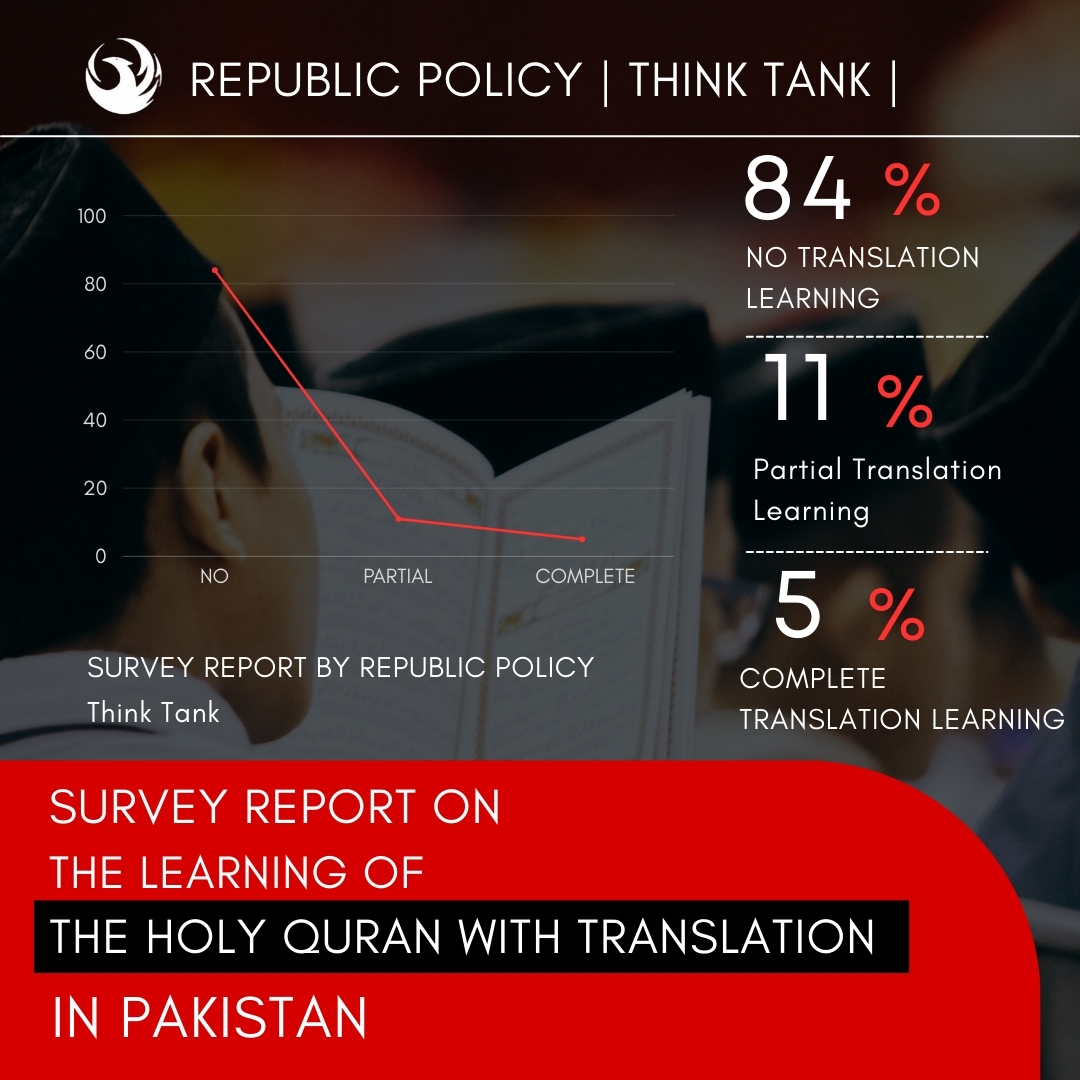Hafiz Mudassir Rizwan, Dr. Ahmed Ali
Introduction:
The Republic Policy Think Tank conducted a comprehensive survey to assess the current trends in learning the Quran with translation among the Pakistani Muslim population. Ninety-seven per cent of the Pakistani population observes the religion of Islam, and the Quran is the primary source of knowledge. Therefore, a Muslim must understand the Quran. As the Quran is in Arabic, learning and translating the Arabic language is essential. The survey was designed to emphasize the importance of understanding the Quran in Urdu or local languages and to provide recommendations for improving this practice.
Survey Methodology: The survey included a total of 2,200 respondents from various walks of life, covering all provinces, age brackets, professions, genders, and communities. The Data is collected from more than 15 districts of Pakistan which are normally bigger in population. The Districts include Karachi, Hyder Abad, Sakhar, Quetta, Mardan, Peshawar, DI Khan, Islam Abad, Lahore, Faisal Abad, Bahawalpur, Multan, DG Khan, Sargodha and Gujranwala.
The questionnaire asked, “Have you learned the Quran in Urdu or your Local language?” There were three response options: 1 Yes, 2 No, and 3 Partially.
Key Findings:
The following are the key findings of the survey:
No Translation Learning: 84% of respondents indicated that they had not learned the Quran with translation.
Partial Translation Learning: 11% of respondents reported that they had partially learned the Quran with Urdu or local language translation. Complete Translation Learning: Only 5% of respondents had thoroughly learned the Quran with translation.
Observations:
A significant majority of respondents (84%) have not engaged with the Quran through translation, underscoring the urgent need to bridge the gap in understanding the religious text in their native language. Only a small fraction (5%) have fully learned the Quran with translation, underscoring the urgent need for increased efforts to promote this practice. Among Islamic Madrassah students, more than 86% memorized the Quran in Arabic without translation, pointing to a systemic issue in religious education.
Pl, subscribe to the YouTube channel of republicpolicy.com
Recommendations:
Incorporating Translation in Curriculum: Educational institutions, including Madrassahs, should integrate Quranic translation into their syllabi to facilitate a better understanding of the text.
Teacher Training: Investing in training teachers to proficiently teach Quranic translation will ensure that students grasp the meanings and teachings effectively.
Awareness Campaigns: Conducting awareness campaigns to emphasize the importance of understanding the Quran can encourage individuals to learn it with translation.
Accessible Resources: Providing easy access to translated Quranic materials, including digital platforms and printed books, will support learning.
Encouraging Parental Involvement: Parents play a crucial role in supporting their children’s education, and they should be encouraged to support their children in learning the Quran with translation from an early age.
Community Programs: Implementing community programs and study circles focused on Quranic translation can foster collective learning and deeper engagement with the text, instilling a sense of shared responsibility in the community.
Conclusion: The survey underscores the need to prioritize the translation of the Quran in educational curricula. By implementing the recommendations, we can foster a more profound connection with the Quran, enriching the spiritual and intellectual lives of the community and bringing hope for a better understanding of the teachings. These changes have the potential to significantly improve the religious education landscape in Pakistan.
















